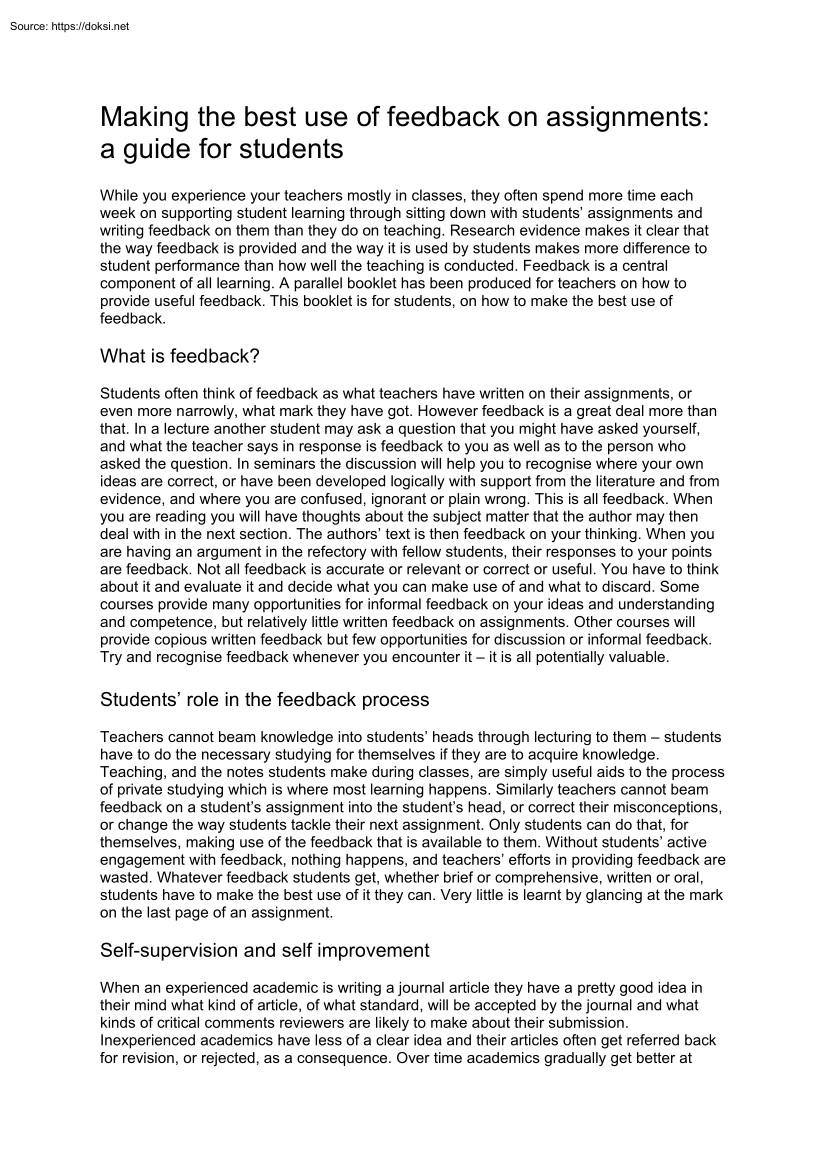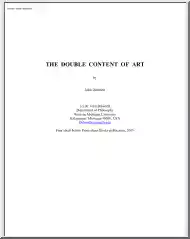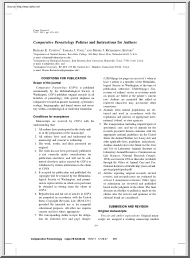Please log in to read this in our online viewer!

Please log in to read this in our online viewer!
No comments yet. You can be the first!
What did others read after this?
Content extract
Making the best use of feedback on assignments: a guide for students While you experience your teachers mostly in classes, they often spend more time each week on supporting student learning through sitting down with students’ assignments and writing feedback on them than they do on teaching. Research evidence makes it clear that the way feedback is provided and the way it is used by students makes more difference to student performance than how well the teaching is conducted. Feedback is a central component of all learning. A parallel booklet has been produced for teachers on how to provide useful feedback. This booklet is for students, on how to make the best use of feedback. What is feedback? Students often think of feedback as what teachers have written on their assignments, or even more narrowly, what mark they have got. However feedback is a great deal more than that. In a lecture another student may ask a question that you might have asked yourself, and what the teacher says
in response is feedback to you as well as to the person who asked the question. In seminars the discussion will help you to recognise where your own ideas are correct, or have been developed logically with support from the literature and from evidence, and where you are confused, ignorant or plain wrong. This is all feedback When you are reading you will have thoughts about the subject matter that the author may then deal with in the next section. The authors’ text is then feedback on your thinking When you are having an argument in the refectory with fellow students, their responses to your points are feedback. Not all feedback is accurate or relevant or correct or useful You have to think about it and evaluate it and decide what you can make use of and what to discard. Some courses provide many opportunities for informal feedback on your ideas and understanding and competence, but relatively little written feedback on assignments. Other courses will provide copious written feedback
but few opportunities for discussion or informal feedback. Try and recognise feedback whenever you encounter it – it is all potentially valuable. Students’ role in the feedback process Teachers cannot beam knowledge into students’ heads through lecturing to them – students have to do the necessary studying for themselves if they are to acquire knowledge. Teaching, and the notes students make during classes, are simply useful aids to the process of private studying which is where most learning happens. Similarly teachers cannot beam feedback on a student’s assignment into the student’s head, or correct their misconceptions, or change the way students tackle their next assignment. Only students can do that, for themselves, making use of the feedback that is available to them. Without students’ active engagement with feedback, nothing happens, and teachers’ efforts in providing feedback are wasted. Whatever feedback students get, whether brief or comprehensive, written or
oral, students have to make the best use of it they can. Very little is learnt by glancing at the mark on the last page of an assignment. Self-supervision and self improvement When an experienced academic is writing a journal article they have a pretty good idea in their mind what kind of article, of what standard, will be accepted by the journal and what kinds of critical comments reviewers are likely to make about their submission. Inexperienced academics have less of a clear idea and their articles often get referred back for revision, or rejected, as a consequence. Over time academics gradually get better at writing articles, through experience of reading reviewers’ comments, thinking about them, and responding to these in subsequent drafts, and eventually produce top quality work that journals will most likely accept and publish. The crucial thing here is that the reviewers cannot do the thinking for the academic, or the make the necessary revisions for the academic –
academics have to learn to ‘supervise themselves’ and have an awareness, while they are writing, of what is good enough and what is not, and bring this understanding to bear on the way they write. They have to recognise when they have not yet reviewed the literature thoroughly enough or have not drawn conclusions from their evidence carefully enough, and they need to make improvements to their own journal article in the light of this awareness, before they submit it to the journal. They also enlist their colleagues to read drafts, or check their statistical analyses, getting informal feedback where they can to help them to improve their article. In other words the main use of feedback is while the article is being written rather than afterwards. This is exactly the same process that students have to go through - making what use they can of whatever feedback they get, from whatever source, and thinking, as they write their assignment, about the standards they are supposed to
achieve, about the academic conventions for argument and citing evidence that they must meet, about the clarity and coherence of their arguments, and so on. They need to use this awareness to repeatedly revise and improve their assignment as they go along, before it is submitted. In this sense the main feedback process going on is from the student to themselves in a kind of private internal conversation, with feedback from others being additional information which gradually increases the sophistication of their own self-supervision. The role of assessment criteria All courses should provide written criteria which are used by teachers in marking students’ work. You should be able to understand why you received the grade you were given in relation to some kind of formal statement of expectations and standards so you know what you are aiming for and you can tell what you are not yet good at. If your course does not provide a statement of criteria, then ask for it. If you don’t
understand the criteria, ask for an explanation. However despite teachers’ best intentions, not all criteria are easy to make sense of. If you do not know how to write a good conclusion then the criterion ‘Good conclusion’ isn’t much help. Even teachers do not fully agree about the meaning of, or relative importance of, all their criteria. This is not a result of negligence – it is simply impossible to capture the complex qualities of excellent academic work in a short set of snappy phrases. Writing ever more detailed criteria in an attempt to pin them down has been shown not to help. You need examples of good and bad work, and examples of how specific criteria are met well and badly, before you can develop a sense of what a set of written criteria is intended to convey. And students need to learn to make judgements about how well examples of student work meet criteria, which involves self and peer assessment (see below). The role of self-assessment If you are going to
self-supervise effectively then you need to be able to self-assess. Before you submit your assignment for marking, get out the criteria you have been given for the course, and review your own assignment in relation to these criteria. Also get out the feedback you have been given on previous assignments of a similar kind, even if they were on previous courses. What did you do well and what needed improvement? Have you made the same mistakes again? You may well spot important things that your teachers are looking for, as outlined in the criteria, that you have not addressed well or not done at all, which will tell you how to revise your draft to make it better. You probably already know where you have cut corners and where you don’t yet understand things well enough to write about them convincingly. Leave yourself time to revise your draft in the light of this self-assessment, don’t just hand it in without even checking it. When you have run out of time in making revisions and
improvements, but before you hand the assignment in, make a guess about what grade you will get and why. This is not easy to do and even experienced academics disagree about marks as it involves professional judgement which is inevitably subjective. When you get your assignment back, compare your self-assessment grade and comments with what the teacher thought and this will tune up your understanding of criteria and standards that you can use to self-supervise next time. If you do not understand the gap between your judgements and those of your teacher, ask for an explanation (see below). The role of peer assessment One of the ways that academics learn about the standards that journals expect, and how to meet these standards in their own publications, is through acting as a reviewer for a journal. They critique draft articles submitted to the journal by other academics’ in a similar way to marking students’ work. In doing this they see examples of how very high quality articles
are written, and see rather more examples of poor quality articles that they may decide to reject. It is through seeing these examples and recognising their strengths and weaknesses that they develop a sense of standards and see how to write articles of their own that journals are likely to accept. Exactly the same is true for students They need to see examples of assignments on topics similar to the ones they are tackling themselves – good, bad and indifferent assignments – and learn to spot the difference and recognise why some are good and others are not. Ask your teacher to organise a ‘peer assessment’ session in which they provide anonymised examples of assignments they have already marked – ones that received an ‘A+’, a ‘B-‘ and an ‘F’ – and have a go at marking them yourselves, discussing your judgements with other students and finally comparing your grades with the grades the teacher actually gave. It is though seeing examples and understanding why some
are better than others that you will develop a sense of standards that will provide a basis for self-assessment and selfsupervision. If your teacher cannot do this, then at least persuade them to provide such examples as handouts, or on the internet, so you can see what an ‘A’ and a ‘C’ looks like. Ask your friends to show you their assignments after they have been marked – agree that if they show you theirs you’ll show them yours – and chat about why you got the grades you did and what you could do differently in future to get better grades. Asking for feedback Teachers are not clairvoyant and do not always provide feedback on those aspects of your assignment that you are most concerned about. They will appreciate you telling them, when you submit your assignment, what you would particularly like feedback on: for example how you have used sources to back up your arguments, or whether your selected reading material missed out better and more relevant sources. Ask them
for an example of something you were not able to do well, or at all. Ask for the page number of a book that would be useful to you. Some requests, such as correcting your English, they may decline to respond to, but they may be able to refer you to expert help on academic uses of English. Attach a sheet to your assignment making a specific request for the feedback you want. You are then more likely to get feedback that you will read and your teacher will feel more confident that they have not wasted their time writing feedback you will ignore and so they are more likely to be detailed. Requesting additional feedback However thoroughly your teacher may have commented on your assignment, you may not understand what they are trying to say, or know what to do to deal with this issue they have commented on next time, or understand how to improve. It is perfectly acceptable to ask your teacher directly what they meant – in an email, by going to their office during their office hours
for students or by booking an appointment. Teachers generally welcome students who take their feedback seriously and usually enjoy face to face teaching with an individual student more than they enjoy marking, though they may well be busy and hard to track down. Persist – you have a right to clear feedback If you cannot even read what has been written you have the right to ask for it to be written legibly, and to complain if your request is not responded to adequately. Grades You have a right to understand why you got the grade you did. However you do not normally have the right to query your grade and if all you are doing is trying to badger the teacher into improving your grade you will get short shrift, and deserve it. Professor Graham Gibbs (NTF) Honorary Professor University of Winchester
in response is feedback to you as well as to the person who asked the question. In seminars the discussion will help you to recognise where your own ideas are correct, or have been developed logically with support from the literature and from evidence, and where you are confused, ignorant or plain wrong. This is all feedback When you are reading you will have thoughts about the subject matter that the author may then deal with in the next section. The authors’ text is then feedback on your thinking When you are having an argument in the refectory with fellow students, their responses to your points are feedback. Not all feedback is accurate or relevant or correct or useful You have to think about it and evaluate it and decide what you can make use of and what to discard. Some courses provide many opportunities for informal feedback on your ideas and understanding and competence, but relatively little written feedback on assignments. Other courses will provide copious written feedback
but few opportunities for discussion or informal feedback. Try and recognise feedback whenever you encounter it – it is all potentially valuable. Students’ role in the feedback process Teachers cannot beam knowledge into students’ heads through lecturing to them – students have to do the necessary studying for themselves if they are to acquire knowledge. Teaching, and the notes students make during classes, are simply useful aids to the process of private studying which is where most learning happens. Similarly teachers cannot beam feedback on a student’s assignment into the student’s head, or correct their misconceptions, or change the way students tackle their next assignment. Only students can do that, for themselves, making use of the feedback that is available to them. Without students’ active engagement with feedback, nothing happens, and teachers’ efforts in providing feedback are wasted. Whatever feedback students get, whether brief or comprehensive, written or
oral, students have to make the best use of it they can. Very little is learnt by glancing at the mark on the last page of an assignment. Self-supervision and self improvement When an experienced academic is writing a journal article they have a pretty good idea in their mind what kind of article, of what standard, will be accepted by the journal and what kinds of critical comments reviewers are likely to make about their submission. Inexperienced academics have less of a clear idea and their articles often get referred back for revision, or rejected, as a consequence. Over time academics gradually get better at writing articles, through experience of reading reviewers’ comments, thinking about them, and responding to these in subsequent drafts, and eventually produce top quality work that journals will most likely accept and publish. The crucial thing here is that the reviewers cannot do the thinking for the academic, or the make the necessary revisions for the academic –
academics have to learn to ‘supervise themselves’ and have an awareness, while they are writing, of what is good enough and what is not, and bring this understanding to bear on the way they write. They have to recognise when they have not yet reviewed the literature thoroughly enough or have not drawn conclusions from their evidence carefully enough, and they need to make improvements to their own journal article in the light of this awareness, before they submit it to the journal. They also enlist their colleagues to read drafts, or check their statistical analyses, getting informal feedback where they can to help them to improve their article. In other words the main use of feedback is while the article is being written rather than afterwards. This is exactly the same process that students have to go through - making what use they can of whatever feedback they get, from whatever source, and thinking, as they write their assignment, about the standards they are supposed to
achieve, about the academic conventions for argument and citing evidence that they must meet, about the clarity and coherence of their arguments, and so on. They need to use this awareness to repeatedly revise and improve their assignment as they go along, before it is submitted. In this sense the main feedback process going on is from the student to themselves in a kind of private internal conversation, with feedback from others being additional information which gradually increases the sophistication of their own self-supervision. The role of assessment criteria All courses should provide written criteria which are used by teachers in marking students’ work. You should be able to understand why you received the grade you were given in relation to some kind of formal statement of expectations and standards so you know what you are aiming for and you can tell what you are not yet good at. If your course does not provide a statement of criteria, then ask for it. If you don’t
understand the criteria, ask for an explanation. However despite teachers’ best intentions, not all criteria are easy to make sense of. If you do not know how to write a good conclusion then the criterion ‘Good conclusion’ isn’t much help. Even teachers do not fully agree about the meaning of, or relative importance of, all their criteria. This is not a result of negligence – it is simply impossible to capture the complex qualities of excellent academic work in a short set of snappy phrases. Writing ever more detailed criteria in an attempt to pin them down has been shown not to help. You need examples of good and bad work, and examples of how specific criteria are met well and badly, before you can develop a sense of what a set of written criteria is intended to convey. And students need to learn to make judgements about how well examples of student work meet criteria, which involves self and peer assessment (see below). The role of self-assessment If you are going to
self-supervise effectively then you need to be able to self-assess. Before you submit your assignment for marking, get out the criteria you have been given for the course, and review your own assignment in relation to these criteria. Also get out the feedback you have been given on previous assignments of a similar kind, even if they were on previous courses. What did you do well and what needed improvement? Have you made the same mistakes again? You may well spot important things that your teachers are looking for, as outlined in the criteria, that you have not addressed well or not done at all, which will tell you how to revise your draft to make it better. You probably already know where you have cut corners and where you don’t yet understand things well enough to write about them convincingly. Leave yourself time to revise your draft in the light of this self-assessment, don’t just hand it in without even checking it. When you have run out of time in making revisions and
improvements, but before you hand the assignment in, make a guess about what grade you will get and why. This is not easy to do and even experienced academics disagree about marks as it involves professional judgement which is inevitably subjective. When you get your assignment back, compare your self-assessment grade and comments with what the teacher thought and this will tune up your understanding of criteria and standards that you can use to self-supervise next time. If you do not understand the gap between your judgements and those of your teacher, ask for an explanation (see below). The role of peer assessment One of the ways that academics learn about the standards that journals expect, and how to meet these standards in their own publications, is through acting as a reviewer for a journal. They critique draft articles submitted to the journal by other academics’ in a similar way to marking students’ work. In doing this they see examples of how very high quality articles
are written, and see rather more examples of poor quality articles that they may decide to reject. It is through seeing these examples and recognising their strengths and weaknesses that they develop a sense of standards and see how to write articles of their own that journals are likely to accept. Exactly the same is true for students They need to see examples of assignments on topics similar to the ones they are tackling themselves – good, bad and indifferent assignments – and learn to spot the difference and recognise why some are good and others are not. Ask your teacher to organise a ‘peer assessment’ session in which they provide anonymised examples of assignments they have already marked – ones that received an ‘A+’, a ‘B-‘ and an ‘F’ – and have a go at marking them yourselves, discussing your judgements with other students and finally comparing your grades with the grades the teacher actually gave. It is though seeing examples and understanding why some
are better than others that you will develop a sense of standards that will provide a basis for self-assessment and selfsupervision. If your teacher cannot do this, then at least persuade them to provide such examples as handouts, or on the internet, so you can see what an ‘A’ and a ‘C’ looks like. Ask your friends to show you their assignments after they have been marked – agree that if they show you theirs you’ll show them yours – and chat about why you got the grades you did and what you could do differently in future to get better grades. Asking for feedback Teachers are not clairvoyant and do not always provide feedback on those aspects of your assignment that you are most concerned about. They will appreciate you telling them, when you submit your assignment, what you would particularly like feedback on: for example how you have used sources to back up your arguments, or whether your selected reading material missed out better and more relevant sources. Ask them
for an example of something you were not able to do well, or at all. Ask for the page number of a book that would be useful to you. Some requests, such as correcting your English, they may decline to respond to, but they may be able to refer you to expert help on academic uses of English. Attach a sheet to your assignment making a specific request for the feedback you want. You are then more likely to get feedback that you will read and your teacher will feel more confident that they have not wasted their time writing feedback you will ignore and so they are more likely to be detailed. Requesting additional feedback However thoroughly your teacher may have commented on your assignment, you may not understand what they are trying to say, or know what to do to deal with this issue they have commented on next time, or understand how to improve. It is perfectly acceptable to ask your teacher directly what they meant – in an email, by going to their office during their office hours
for students or by booking an appointment. Teachers generally welcome students who take their feedback seriously and usually enjoy face to face teaching with an individual student more than they enjoy marking, though they may well be busy and hard to track down. Persist – you have a right to clear feedback If you cannot even read what has been written you have the right to ask for it to be written legibly, and to complain if your request is not responded to adequately. Grades You have a right to understand why you got the grade you did. However you do not normally have the right to query your grade and if all you are doing is trying to badger the teacher into improving your grade you will get short shrift, and deserve it. Professor Graham Gibbs (NTF) Honorary Professor University of Winchester




 When reading, most of us just let a story wash over us, getting lost in the world of the book rather than paying attention to the individual elements of the plot or writing. However, in English class, our teachers ask us to look at the mechanics of the writing.
When reading, most of us just let a story wash over us, getting lost in the world of the book rather than paying attention to the individual elements of the plot or writing. However, in English class, our teachers ask us to look at the mechanics of the writing.